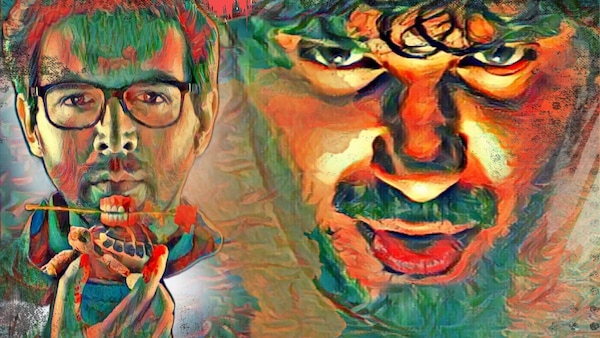What Chup & Freddy Say Of Bollywood's Serial Killer Stories
With the likes of Chup and Freddy, we’ve seen some evidence of an industry quietly willing itself towards characters and stories that have — at least as a matter of culture — evaded us.

Last Updated: 03.22 AM, Dec 18, 2022
In a scene from Chup: Revenge of the Artist, Danny (played by Dulquer Salmaan) does a little jig outside his shop. He has just sensed the slightest hint of affection in the eyes of the woman he admires. It’s an elegant, poetic ensemble of seamless movements. Contrast this with the eponymous protagonist from Freddy (starring Kartik Aaryan), where the dance takes an awkward form of catharsis — the ungainly spasm of a restrained self. It’s creepier, punctuated by the prosaic but discomfiting nature of casual violence. In both films, men exact revenge for an intimate form of insult they’ve had to parry in the past. The serial killer film may be a relatively recent phenomenon in Hindi cinema, but with Chup and Freddy, it has graduated to a point where the violence, for the sake of specificity, can be rationalised.
Compared to America’s obsession with serial killers, India has never quite attempted to frame its serial murderers with the same kind of romanticism. Part of it is probably down to the asymmetry of our lives, the fact that so much in this country is practically in a state of disorder, that seeking chaos and violence on a whim or for inspiration is possibly low on our list of ideas. Crime here is often interpreted as malaise: a culmination of the crushing realities people must navigate on a daily basis. It forms — somewhat — the root of Anurag Kashyap’s Raman Raghav 2.0, and the Rani Mukherji-led Mardaani 2, where serial killers turn into exponents of a kind of brutal banality... the kind that is birthed in ignominy.
The serial killer has mostly been used as an invisible pivot in our cinema. In Akshay Kumar’s Cuttputlli and in Zee5’s disappointing Forensic, for example, the serial killer is merely a ruse to extract virtuosity out of the protagonist. Rarely do they become anything more than a rumour, a clue, or a quandary. Rarer even is the possibility that they would at some point be humanised. Whether that’s a creative handicap or a moralistic choice, is debatable. But with the likes of Chup and Freddy, we’ve at least seen some evidence of an industry quietly willing itself towards characters and stories that have, at least as a matter of culture, evaded us.
Netflix’s Indian Predator has highlighted that there isn’t exactly a dearth of grim acts of serial violence in the Indian context, but possibly the wherewithal to pick these stories and give them the kind of treatment that Indian audiences can digest. The language, of course, has to be altered. Mardaani 2, for instance, routinely breaks the fourth wall to make the serial killer seem accessible. It tempers the sense of dreariness around a film that can so obviously trigger and provoke. Not too dissimilarly, Chup and Freddy use violence as an aesthetic jab rather than a loud punch. At no point is it revolting or gruesome.
Freddy and Danny might sound alike, but they embody contrasting methodologies. In fact, Freddy is more cinematic in a functional sense compared to Danny, who is blunt and direct. While the former rejoices in the torturous mental games that preface the final act, Danny’s ideas take shape after he has murdered and moved on. The contrast here is between the journeyman and the poet, both benevolent carriers of similar life philosophies. Vishal Bharadwaj’s 7 Khoon Maaf, though modelled on a Ruskin Bond story, shares its genesis with David Fincher’s gory and discomfiting Seven. Murder here is a milestone, a tool of biblical justice being wielded by men and women who simply, even if provocatively, act as vehicles. The serial killer here is a poster boy of sorts, a stylist delivering both reconciliation and art. Closer to reality, of course, evil is complex but also linear – action breeds reaction. David Fincher’s Mindhunter, quite possibly the most comprehensive meditation on the mind of serial killers, tells us “the best indicator of future violence is past violence.” For both Freddy and Danny, it isn’t a case of physical, but mental violence.
Both have a history, if not with violence, then with intimate forms of grief and suffering. They retaliate, in contrasting methods, but they rarely explode. You can possibly imagine Freddy and Danny sitting across from each other, having a conversation that neither finds eerie or suspicious in the absence of context. No amount of anger can be sieved through gimmickry alone, and it is pleasing to see Hindi filmmakers trying to redeem difficult characters by writing them empathetically. So much so, that Danny and Freddy, are nothing but difficult protagonists, men inconceivable to the imagination but possibly available to us in the flesh. Murder, to them after all is a form of compassion they show towards their previous selves. As strange as it might sound, it’s relatable.
